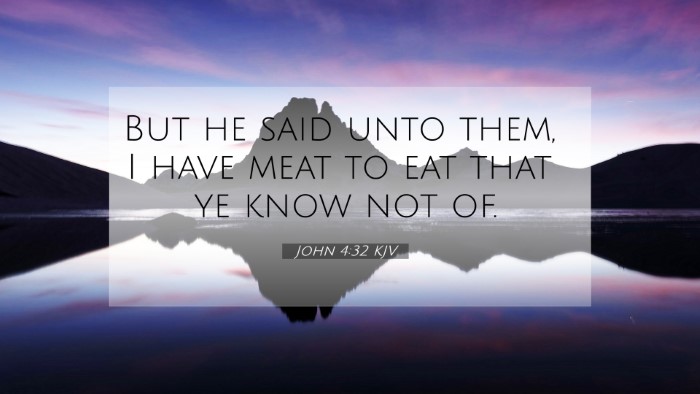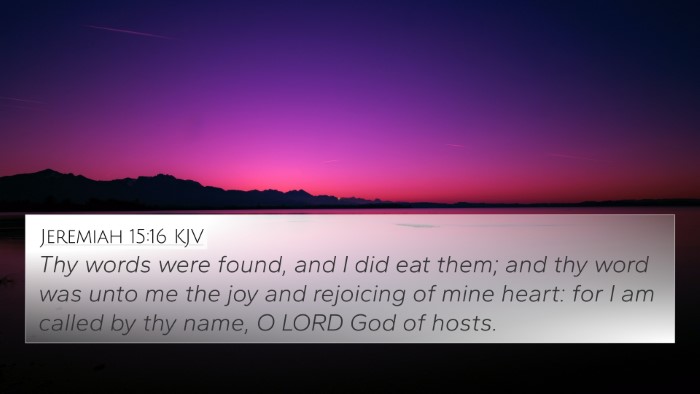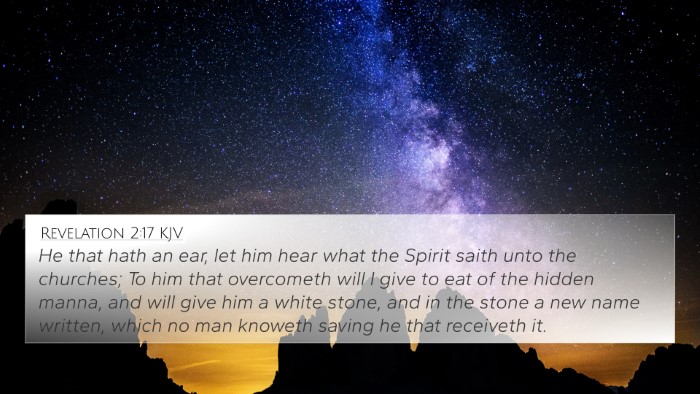Understanding John 4:32
Verse: John 4:32 - "But he said to them, 'I have food to eat that you do not know about.'
Summary of Meaning
In this verse, Jesus speaks to His disciples about a food that sustains Him, indicating a spiritual nourishment that transcends physical needs. This verse emphasizes the difference between earthly and heavenly sustenance.
Commentary Insights
Matthew Henry's Commentary
Matthew Henry highlights that Jesus points to a spiritual fulfillment that comes from doing God's will. Disciples are focused on immediate physical needs, while Jesus teaches them about the importance of spiritual ministry and obedience to God. This concept reveals the dual nature of existence - the physical and the spiritual.
Albert Barnes' Notes
Albert Barnes notes that Jesus' statement suggests that His sense of fulfillment is derived from carrying out His Father's mission. The term 'food' metaphorically indicates the spiritual satisfaction that arises from performing God's work. Barnes emphasizes that spiritual fulfillment is of greater significance than physical sustenance.
Adam Clarke’s Commentary
Adam Clarke elaborates on the idea that Jesus' ministry is a nourishment in itself. He contrasts the physical food that His disciples are concerned with to the spiritual 'food' that He revels in through teaching, healing, and saving souls. This sets a precedent for Christians to seek spiritual fulfillment over mere physical needs.
Inter-Biblical Connections
This verse connects to various other scriptures that collectively enrich its interpretation:
- Matthew 4:4: "But He answered and said, ‘It is written, Man shall not live by bread alone, but by every word that proceeds from the mouth of God.’" – emphasizing the necessity of spiritual food over physical sustenance.
- John 6:35: "And Jesus said to them, 'I am the bread of life. He who comes to Me shall never hunger, and he who believes in Me shall never thirst.'" – reinforcing Jesus as the source of spiritual nourishment.
- 1 Peter 2:2: "As newborn babes, desire the pure milk of the word, that you may grow thereby." – likening the Word of God to spiritual sustenance necessary for growth.
- Isaiah 55:2: "Why do you spend money for what is not bread, and your wages for what does not satisfy?" – questioning the pursuit of temporary satisfaction over lasting spiritual nourishment.
- Romans 12:1: "I beseech you therefore, brethren, by the mercies of God, that you present your bodies a living sacrifice, holy, acceptable to God, which is your reasonable service." – highlighting the commitment to spiritual service as a form of spiritual nourishment.
- John 4:34: "Jesus said to them, 'My food is to do the will of Him who sent Me, and to finish His work.'" – Jesus clarifies what He means by 'food' focusing on obedience and mission.
- Luke 12:22-23: "Then He said to His disciples, 'Therefore I say to you, do not worry about your life, what you will eat, nor about the body, what you will put on. Life is more than food, and the body is more than clothing.'" – reaffirming the spiritual over the physical in disciples' lives.
Thematic Bible Verse Connections
This teaching about spiritual fulfillment echoes throughout the Gospels and resonates with various themes:
- The Bread of Life: Themes of sustenance and satisfaction found in spiritual truths, especially in relation to Jesus as the ultimate source.
- Obedience and Mission: The relationship between doing God’s will and experiencing true spiritual nourishment.
- Your Identity as Disciples: Understanding the role of discipleship as one of service and dedicated pursuit of God’s mission.
Application for Today
In a world often obsessed with physical needs and satisfying immediate wants, this verse serves as a reminder to focus on spiritual well-being. Believers are encouraged to cultivate their relationship with God through prayer, service, and studying the Word.
Conclusion
John 4:32 provides profound insight into the essence of spiritual nourishment early in Jesus' ministry. By focusing on what it means to truly sustain oneself, Christians are called to reflect on their priorities and align them with the mission of God, thereby achieving true satisfaction through divine purpose.
Cross-Referencing Bible Study
As you contemplate John 4:32, consider these tools for Bible cross-referencing to enrich your understanding and connect threads throughout Scripture:
-
Bible Concordance: A valuable tool to locate precise verses around a theme, word, or idea.
-
Cross-Reference Bible Study Guides: Provide structured pathways for linking verses based on themes.
-
Bible Chain References: A method of connecting related scriptures that deepen study and understanding.
In summary, John 4:32 invites believers into a deeper conversation about what it truly means to be fed by the mission and will of God.













